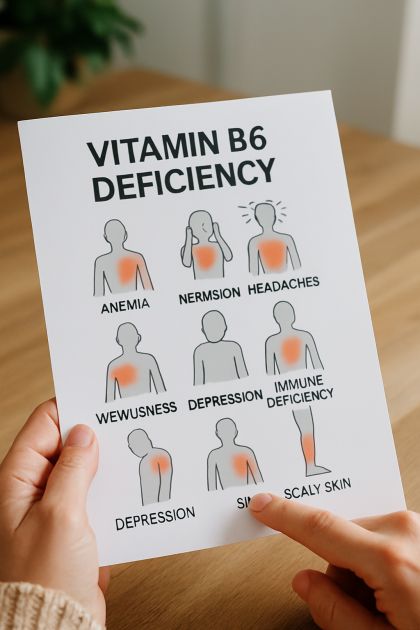Vitamin B6, also known as pyridoxine, is a water-soluble vitamin that plays a crucial role in numerous bodily functions, including metabolism, neurotransmitter synthesis, and immune function. Despite its importance, vitamin B6 deficiency is not uncommon and can lead to a variety of health issues. Understanding the signs of vitamin B6 deficiency is essential for maintaining overall health and well-being.
In this article, we will explore the critical signs of vitamin B6 deficiency and how they can impact your health. From physical symptoms like skin rashes and anemia to mental health issues such as mood changes and cognitive difficulties, recognizing these signs can help you address the deficiency early and seek appropriate treatment.
Advertisement
1. Understanding Vitamin B6 and Its Role in the Body
Vitamin B6 is involved in over 100 enzymatic reactions in the body and is essential for amino acid metabolism, neurotransmitter production, and the synthesis of hemoglobin. It also plays a role in converting food into energy and maintaining healthy brain function. The recommended dietary allowance (RDA) for vitamin B6 varies by age, gender, and life stage, ranging from 1.2 mg to 2 mg per day for adults.
Vitamin B6 is found in a variety of foods, including poultry, fish, potatoes, chickpeas, and bananas. Despite its availability in many foods, certain populations, such as older adults, individuals with kidney disease, and those with malabsorption disorders, may be at a higher risk of deficiency.
2. Fatigue and Low Energy Levels
One of the earliest signs of vitamin B6 deficiency is fatigue and a persistent feeling of low energy. This occurs because vitamin B6 is crucial for the metabolism of proteins and carbohydrates, which are primary sources of energy for the body. Without adequate B6, the body's ability to convert these nutrients into usable energy is impaired.
Individuals experiencing unexplained tiredness or difficulty carrying out daily activities may want to consider their vitamin B6 intake. Ensuring adequate consumption of B6-rich foods or supplements can help alleviate these symptoms and restore energy levels.
3. Mood Changes and Irritability
Vitamin B6 is vital for the production of neurotransmitters such as serotonin, dopamine, and gamma-aminobutyric acid (GABA), which regulate mood and emotional health. Deficiency in this vitamin can lead to mood changes, irritability, depression, and anxiety.
Studies have shown that supplementation with vitamin B6 can improve mood and reduce symptoms of depression, particularly in individuals with a known deficiency. If you experience sudden mood swings or prolonged periods of irritability, evaluating your vitamin B6 levels may be beneficial.
4. Skin Rashes and Dryness
A common skin-related symptom of vitamin B6 deficiency is the development of a red, itchy rash known as seborrheic dermatitis. This rash often appears on the face, neck, and scalp and can be accompanied by dry, flaky skin.
The skin requires adequate B6 to maintain healthy collagen production and skin cell renewal. A deficiency can disrupt these processes, leading to skin issues. If you notice persistent skin problems, increasing your intake of vitamin B6 through diet or supplements might be necessary.
5. Cracks at the Corners of the Mouth
Angular cheilitis, characterized by cracks and sores at the corners of the mouth, can be a sign of vitamin B6 deficiency. This condition can cause pain and discomfort, making it difficult to eat or speak.
Vitamin B6 is important for maintaining the health of mucous membranes, and a deficiency can lead to their breakdown. Ensuring sufficient intake of vitamin B6 can help prevent and heal these painful sores.
6. Weakened Immune System
Vitamin B6 plays a crucial role in supporting the immune system. It is involved in the production of antibodies and white blood cells, which are critical for fighting infections.
A deficiency in vitamin B6 can lead to a weakened immune response, making individuals more susceptible to infections and illnesses. Increasing vitamin B6 intake can strengthen the immune system and improve overall health.
7. Tingling and Numbness in Extremities
Neuropathy, characterized by tingling and numbness in the hands and feet, can result from a vitamin B6 deficiency. This occurs because vitamin B6 is essential for nerve function and health.
Long-term deficiency can lead to more severe nerve damage and complications. Addressing a B6 deficiency early can help prevent these symptoms and maintain proper nerve function.
8. Cognitive Difficulties and Confusion
Vitamin B6 is crucial for brain health and cognitive function. A deficiency can lead to confusion, difficulty concentrating, and memory problems.
These cognitive difficulties are often linked to the role of vitamin B6 in neurotransmitter synthesis. Ensuring adequate B6 intake can support brain health and improve cognitive function, particularly in older adults.
9. Anemia and Pale Skin
Vitamin B6 is necessary for the production of hemoglobin, the protein in red blood cells that carries oxygen throughout the body. A deficiency can lead to anemia, characterized by pale skin, fatigue, and shortness of breath.
If you experience symptoms of anemia, such as unexplained paleness or persistent fatigue, it may be helpful to assess your vitamin B6 intake and consider dietary adjustments or supplementation.
10. Nausea and Vomiting
Nausea and vomiting are less common but can occur in cases of severe vitamin B6 deficiency. These symptoms are often seen in conjunction with other deficiency signs.
Addressing vitamin B6 deficiency through dietary changes or supplements can help alleviate these gastrointestinal issues and improve overall digestion.
11. Increased Sensitivity to Sunlight
Sensitivity to sunlight, resulting in easy sunburn or a rash after minimal sun exposure, can be a sign of vitamin B6 deficiency. This occurs because vitamin B6 is involved in skin health and protection against UV damage.
Advertisement
Individuals experiencing increased photosensitivity should consider evaluating their vitamin B6 levels and increasing their intake of B6-rich foods or supplements to help protect their skin.

